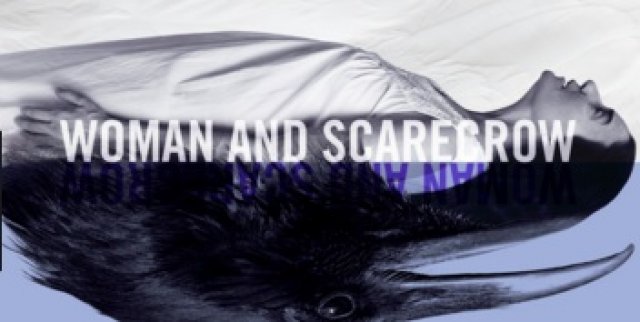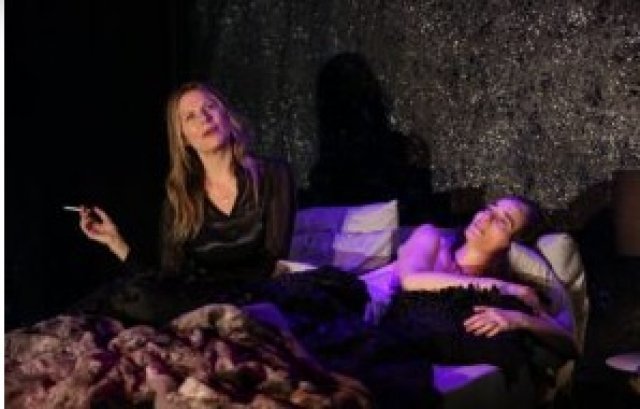Woman and Scarecrow at the Irish Repertory Theater
Marina Carr, an Important Irish Playwright
By: Rachel de Aragon - Jun 14, 2018
It is now in the Midlands of Ireland. A bitter middle aged woman drifts in and out of the multi-layered consciousnesses. She is dying. Ireland's emerging premier female playwright Marina Carr invites us into attend her last moments.
The room is starkly modern in its frugality of purpose. A small side table and a CD player are dominated by an opulent bed. We are aware of a door to the other rooms, but they can’t be seen. The door to the wardrobe, a plain undecorated part of the wall, presents an ominous exit to the future. The mysterious figure in the cupboard is exposed early on as a crow’s hand, and ultimately emerges as an avian creature. The setting by Charlie Corcoran in Scott McLucas Small Theater is created for maximum effect.
Lighting by Michael Gottlieb suggests the mood. The bedroom is suffused with changing colors, symbolizing the changing emotional texture.
The theme of returning to the West, to the sea where Woman was born is recurrent. Drowning, crossing over, breathing the breath of life, the Western sea speaks. It is after all, the mythological road to the Otherworld of the Ancients.
Woman and Scarecrow is a tone poem on the last hours of a woman’s life. Humor has its place in this scalding review of life, and, as in life itself, laughter cuts through the revery. As the Irish poet Patrick Kavanagh said, “Tragedy is merely underdeveloped comedy.” There is a bit of both in Carr's vision.
The language is evocative. Sometimes words are harsh and disaffecting. At others, they serve to celebrate life. Director Ciaran O'Reilly conducts this song. It is not a lament in the Irish tradition but rather a contentious demand for answers. Woman moves intently from the fragile reality of her death, the rageful struggle with her emotional wounds and ironic observations to the sensuous remembrances of her life. She affirms her right to bitterness as well as her right to have lived life passionately. It is her Scarecrow that complains of having been trapped by her failings to break out of the prison of her own creation.
Woman is the mother of eight children. Only when she is pregnant does she feel alive. Has she used children as a place to hide her own lost sense of self, as Scarecrow asserts? Abused by her husband, who leaves for other women and returns like a yo-yo, she ends life in his embrace. He has not become the man she longed for. She has tortured him as much as she can be telling tales of her own dalliances, real or perhaps fantasized. One of them is real. The diamond ring her lover gave her and is taken by her husband while she still lives. Aunty Ah, brings a sharp bit of humor to the scene. However, this woman who raised Woman fell short in kindness and compassion. Can Aunty's conviction that the dress of the Holy Virgin is always a celestial blue offer comfort? Angers, accusations, and Woman's howling rage torment her final moments. Yet it is her own spectre who comes to judge her in the end.
The Irish Repertory does a powerful job. Four impeccable actors, Stephanie Roth Haberle, Pamela L. Gray, Aidan Redmond and Dale Soules, fill the stage with uncompromising depth and do justice to Carr's rich and poetic language.
Sound created by Ryan Rumery is important. We are embraced by a whirlwind, whooshes and stinging, strident rushes. Chopin is played in the background and the Moon Song from Dvorak's Rusalka recalls a water nymph's wish to live in the human world and her return to the waters of the marshes.
Carr’s plays have frequently attracted controversy for their portraits of damaged women, bad mothers and unholy families. For me there is something in her life view that juxtaposes Catholicism and a Beckett-like existentialism which emerges in a Classical Greek perspective on our battle with our fates. Carr says of herself; “There is something greater than ourselves. I guess that's the fascination with fate-- it's the quest for the thing outside yourself.”


